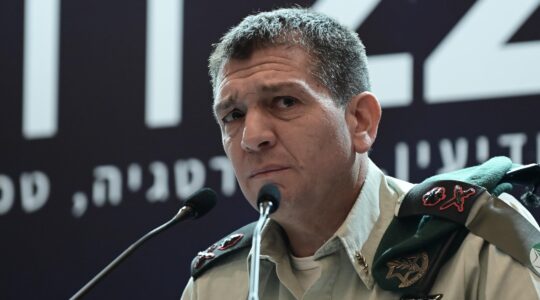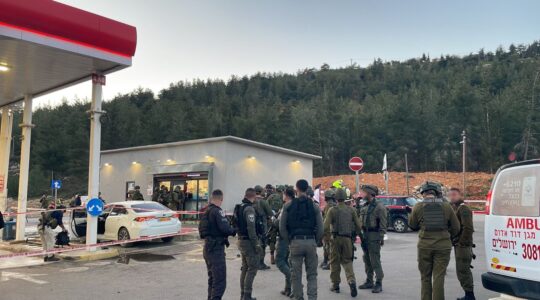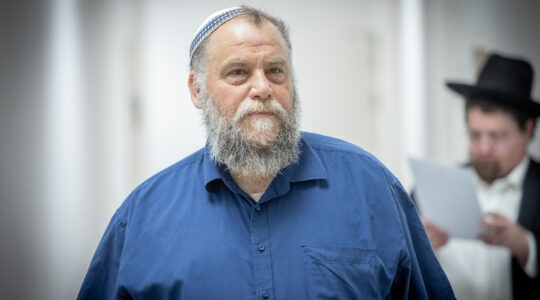NEWS ANALYSIS
JERUSALEM (JTA) — The six-month truce between Israel and Hamas is due to end Friday, and it appears the Hamas regime in the Gaza Strip will not renew it.
That does not necessarily mean a big blowup is imminent; parties on both sides oppose major escalation. But the sporadic rocket fire by Hamas and other Palestinian militants into Israel could provoke heavy Israeli retaliation and ultimately lead to the major showdown in Gaza that many moderates on both sides would like to avoid.
Hamas is banking on the assumption that Israel will not stage a large-scale military operation in Gaza during this election season. If the rockets keep flying over the border, however, electoral considerations actually could prove a catalyst for confrontation.
Despite the truce, Kassam rocket attacks on Israeli civilians in the Gaza perimeter area resumed in mid-November, after Israeli troops killed six Hamas militiamen smuggling weapons from Egypt into Gaza. Since then, the Kassam attacks have become an almost-daily occurrence. There is strong pressure on Defense Minister Ehud Barak to hit back hard, especially if Hamas refuses to extend the cease-fire, which began June 19.
Hamas leaders reportedly are at odds over whether to extend the truce. Its Damascus-based leader, Khaled Mashaal, and the military wing in Gaza are firmly against its renewal. The Gaza-based political wing, led by Ismail Haniyeh, the deposed Palestinian Authority prime minister, apparently is ready to renew if it can improve the terms.
Both groups accuse Israel of not keeping its end of the deal: opening border crossing points to and from Gaza, extending the truce to the West Bank and abstaining from military operations in Gaza. Mashaal and his allies say Israel’s violations of these terms constitute sufficient reason not to renew the truce. Haniyeh and his allies counter that if Israel can be pressured into opening the border crossing points in return for an extension of the truce, it should be considered.
Either way, the Israeli army is bracing for more rocket attacks. Military analysts say Hamas plans to introduce a three-pronged strategy to change the military balance in its favor: building up a strong presence in the area near the border fence to deter Israeli ground operations; deterring Israeli attacks from the air by responding with massive rocket fire whenever they occur; and keeping up sporadic rocket attacks on Israeli civilians to pressure Israel into opening Gaza’s border crossings.
Hamas also has strong political considerations for letting the truce expire. The radical Islamist organization is at loggerheads with the secular Fatah faction over extending P.A. President Mahmoud Abbas’ term of office when it expires Jan. 9.
Abbas, the Fatah leader, wants to stay on for at least another six months, though his aides reportedly told the London-based Al-Hayat newspaper this week that Abbas is not interested in running for re-election. Hamas is demanding immediate elections and threatening to name jailed Hamas legislator Abdel Aziz Duwaik, the speaker of the P.A. Parliament, acting president in Abbas’ stead.
In this power struggle, allowing the truce to expire enables Hamas to claim the moral high ground by arguing that while it is stepping up the armed struggle against the occupation, Abbas is collaborating with it through aimless peace talks with Israel.
Local Israeli leaders who live within rocket distance of Gaza are dismissive of the talk of extending the truce. They say the rocket and mortar fire has rendered it effectively over and are calling on the government to take strong action against the ongoing attacks.
Jerusalem is divided on the issue.
Foreign Minister Tzipi Livni, the Kadima leader, is pressing for a strong military response, while Barak is urging caution. Livni argues that it is intolerable on principle for a sovereign country to put up with daily rocket attacks on its civilians. Furthermore, she insists that Israel’s strategic goal in Gaza should be to topple the Hamas regime there.
Barak, who is also the head of the Labor Party and a candidate for prime minister, accuses Livni of political posturing and warns against precipitate action that could lead to a major conflagration.
Barak’s response to the latest round of rocket attacks has been to close the border crossing points whenever a Kassam or mortar is fired at Israel, and to open them whenever there is quiet. The time for a major military operation in Gaza, he says, “will not run away.”
His minimalist tactics have not worked, however, and if the rocket attacks persist Barak will have to consider ratcheting up Israel’s military response.
The Israel Defense Forces has several contingency plans, ranging from occupying the main rocket-launching areas in northern Gaza, to retaking the Philadelphi route on the Gaza-Egypt border to stop arms smuggling, to launching a major ground invasion whose goal would be to topple the Hamas regime and destroy the terrorist infrastructure in Gaza.
All the options, however, are problematic. Occupying parts of northern Gaza or the Philadelphi route would make Israeli soldiers targets for militants and are unlikely to achieve IDF goals, and a major incursion into Gaza could mean reoccupying the strip without a clear exit strategy.
Therefore, the army also is considering an alternative deterrent policy: making Hamas pay a heavy price for every rocket it fires. This entails closing crossing points, stopping money transfers into the strip, turning off electricity in Gaza and targeted assassinations of terrorists.
Some politicians, including Kadima’s Haim Ramon, have been urging blanket artillery shelling directed at the sources of the rocket and missile fire. But since most of the rocket attacks are launched from civilian neighborhoods, this almost certainly would take a heavy civilian toll and lead to widespread international condemnation of Israel. Barak reportedly toyed with the idea for a while but was advised against it by the Defense Ministry’s legal adviser.
Likud Party leader Benjamin Netanyahu, the front-runner in polls for prime minister, has not offered a clear-cut strategy. On Wednesday he called on Israel to move from “passive to active defense,” but did not spell out what that means.
All these arguments are reminiscent of the period before the cease-fire went into effect six months ago. The difference now is that both sides have used the truce period to build up their capabilities. Hamas has brought huge amounts of new weaponry into Gaza and built deep, Hezbollah-like fortifications. The IDF has refined its contingency plans and trained forces to carry them out.
The bristling military readiness on both sides, Hamas’ brinkmanship, the pressure from Israelis living in range of Gaza’s rockets and Israeli political posturing in the run-up to the Feb. 10 general elections all make for a heady brew that despite Barak’s best efforts could turn toxic.





